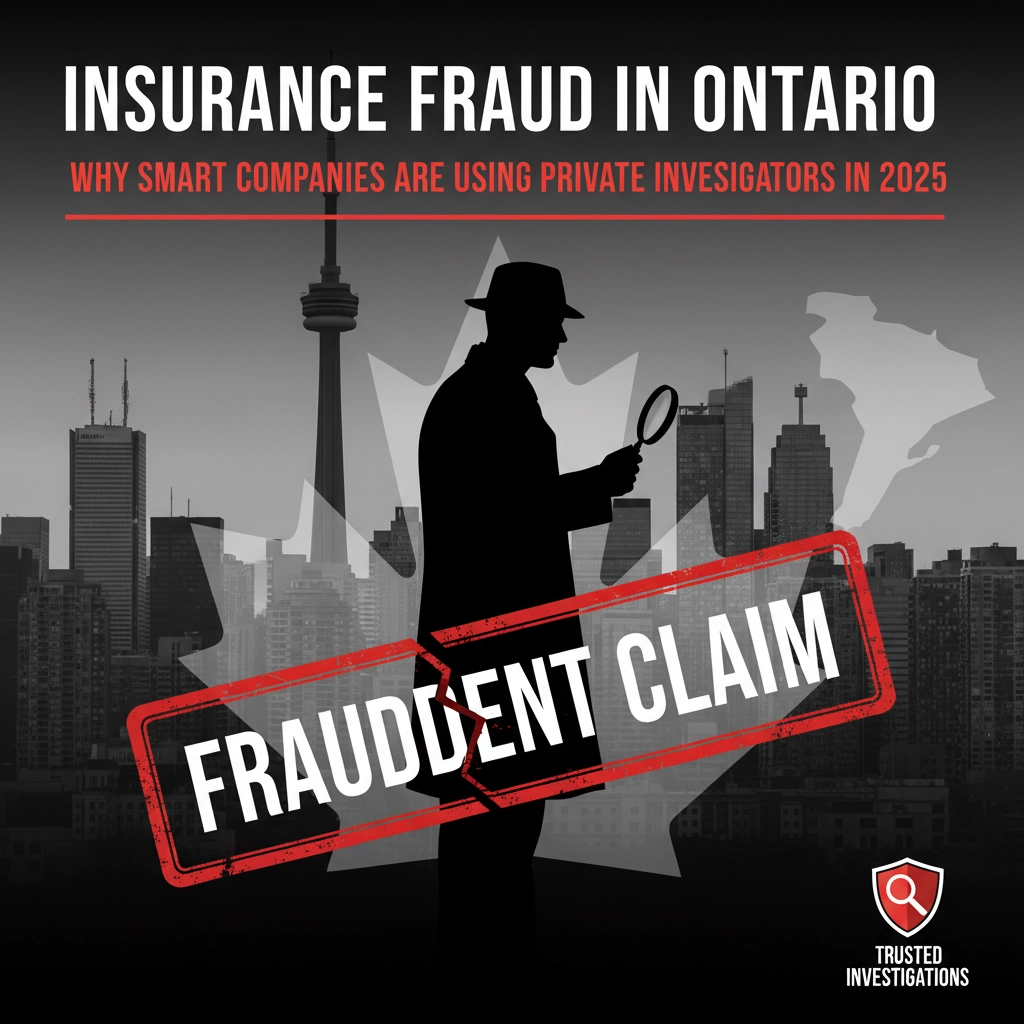Your insurance premiums keep going up, and you’re probably wondering why. Here’s a number that’ll make you think twice: insurance fraud costs Ontario drivers $1.3 billion every single year. That’s not a typo. And guess what? You’re paying for it – about $236 extra on your annual policy just to cover the fraudsters.
The problem’s gotten so bad that smart insurance companies are fighting back with private investigators. And in 2025, it’s not just about catching the obvious scammers anymore.
The Fraud Explosion That’s Hitting Everyone’s Wallet

Let’s talk numbers because they’re pretty shocking. Aviva Canada saw a 76% jump in fraud investigations just in 2024. That’s not a gradual increase – that’s an explosion. Auto-related fraud makes up 67% of all their investigations, which means your car insurance is taking the biggest hit.
But here’s what really gets me: 75% of Ontario drivers know fraud is everywhere, and 40% are worried they might become victims themselves. When three-quarters of people see a problem, you know it’s serious.
The scams aren’t getting simpler either. We’re seeing staged collisions that look incredibly real, injury claims that would make Hollywood proud, vehicle theft operations that are basically organized crime, and something called “ReVINing” where criminals swap vehicle identification numbers. Then there are ghost brokers – people pretending to be legitimate insurance agents who’ll sell you fake policies.
Why Your Regular Claims Process Can’t Handle Modern Fraud
Traditional claims processing was built for honest mistakes and legitimate accidents. Someone rear-ends you, you file a claim, they pay out. Simple. But today’s fraudsters are sophisticated. They study the system, they know the loopholes, and they’re organized.
Your typical claims adjuster might spend 20 minutes reviewing a file. A fraudster planning a staged accident spends weeks preparing. The math doesn’t work out in the insurance company’s favor.
That’s where private investigators come in. They’re not just looking at paperwork – they’re digging into the real story behind claims.
How Private Investigators Are Changing the Game

Private investigators bring something to fraud detection that algorithms and claims adjusters can’t: real detective work. They’re out there doing surveillance, following paper trails, and uncovering patterns that automated systems miss.
Here’s how they typically work: First, they identify suspicious claims through data analysis. Maybe someone’s filing claims in multiple provinces, or their story doesn’t match up with the evidence. Then they dig deeper.
Physical surveillance is still huge. If someone claims they can’t work because of a back injury, but a PI captures video of them moving furniture, that’s case closed. But it’s not just about catching people in lies – it’s about building bulletproof evidence that stands up in court.
Digital forensics is where things get really interesting. Modern investigators can track social media activity, analyze communication patterns, and even use artificial intelligence to spot inconsistencies in claims data. They’re combining old-school detective work with cutting-edge technology.
The Technologies That Are Making Investigators More Effective
We’re not in the 1980s anymore. Today’s private investigators use tools that would have been science fiction just a decade ago.
AI and machine learning systems can process thousands of claims and flag the suspicious ones instantly. They look at everything – claim patterns, provider histories, even postal codes where fraud is more common. This means investigators can focus their time on the cases most likely to be fraudulent.
Data sharing between insurance companies has also become massive. Through organizations like the Canadian Life and Health Insurance Association, companies share information about fraudsters. If someone tries to pull the same scam with multiple insurers, they get caught fast.
Surveillance technology has gotten incredibly sophisticated too. We’re talking about high-definition cameras, GPS tracking, and digital analysis tools that can prove or disprove claims with scientific accuracy.
The Business Case: Why Companies Can’t Afford NOT to Use PIs

Let me break this down in dollars and cents. That $1.3 billion in fraud? It’s not just disappearing into thin air. Insurance companies pass those costs on to legitimate customers. Every fraudulent claim that gets paid out means higher premiums for everyone else.
But here’s the thing – private investigators often pay for themselves. A single major fraud case can involve tens or even hundreds of thousands of dollars. If a PI can prove that claim is fraudulent, the insurance company saves that entire amount, minus the investigator’s fee.
Companies are also seeing fraud detection rates increase by 46% when they use professional investigators. That’s nearly double the number of fraudulent claims they’re catching and stopping.
There’s also a deterrent effect. When word gets out that an insurance company actively investigates suspicious claims, fraudsters tend to look for easier targets. It’s like having a security system – sometimes just knowing it’s there prevents problems.
What Makes a Good Insurance Fraud Investigation
Not all private investigation services are created equal, especially when it comes to insurance fraud. You want investigators who understand the insurance industry, know the legal requirements for evidence, and have experience working with claims adjusters and legal teams.
The best investigators combine multiple approaches. They’ll do surveillance when needed, but they’ll also dive into digital evidence, interview witnesses, and coordinate with law enforcement when criminal activity is involved.
Documentation is crucial. Everything needs to be admissible in court and able to withstand scrutiny from defense lawyers. That means proper chain of custody for evidence, detailed reports, and professional presentation of findings.
Communication matters too. Investigators need to work closely with claims adjusters, legal counsel, and sometimes law enforcement. If they can’t explain their findings clearly or work as part of a team, they’re not much help.
The Regulatory Push That’s Making This Essential

The Financial Services Regulatory Authority (FSRA) isn’t sitting on the sidelines either. They’ve rolled out new Fraud Reporting Service rules that require all auto insurers to submit detailed data on suspected and confirmed fraud regularly.
This isn’t just paperwork – it’s creating a comprehensive database of fraud patterns across Ontario. When investigators have access to this kind of industry-wide data, they can spot trends and prevent scams before they spread.
The regulatory environment is also pushing companies to be more proactive about fraud prevention. It’s not enough to just pay claims and pass costs on to customers anymore. Companies need to show they’re actively fighting fraud, and private investigators are a key part of that strategy.
Looking Ahead: What 2025 and Beyond Holds
The fraud landscape keeps evolving, and so do the tools to fight it. We’re seeing more integration between AI systems and human investigators. The technology identifies potential fraud, and skilled investigators do the detailed work to prove or disprove it.
Cross-border cooperation is also increasing. Fraudsters don’t respect provincial boundaries, so neither can fraud investigation. Ontario companies are sharing data and coordinating investigations with other provinces and even internationally.
The stakes keep getting higher too. As legitimate claims become more expensive due to inflation and rising medical costs, fraudulent claims become more costly as well. That means the return on investment for professional investigation services keeps improving.
Making the Right Choice for Your Business

If you’re running an insurance company or work in claims management, the question isn’t whether to use private investigators – it’s which ones to use and how to integrate them into your fraud prevention strategy.
Look for investigators with specific insurance industry experience. They should understand how claims work, what evidence will hold up in court, and how to work within regulatory requirements. General investigation services aren’t always equipped for insurance fraud cases.
The best approach combines technology with human expertise. You want investigators who use modern tools but also have the experience to know when something doesn’t feel right. Sometimes the most sophisticated fraud schemes are caught because an experienced investigator noticed small details that didn’t add up.
Don’t wait until fraud becomes a major problem. By the time you’re seeing obvious signs of systematic fraud, you’ve already paid out millions in fraudulent claims. The smart companies are building fraud prevention into their standard claims process from day one.
The fight against insurance fraud in Ontario is far from over, but companies that combine professional investigators with modern technology and good data sharing are winning more battles. And when insurance companies win against fraudsters, legitimate customers win too through lower premiums and better service.
Your move is to make sure you’re on the winning side of this fight.

